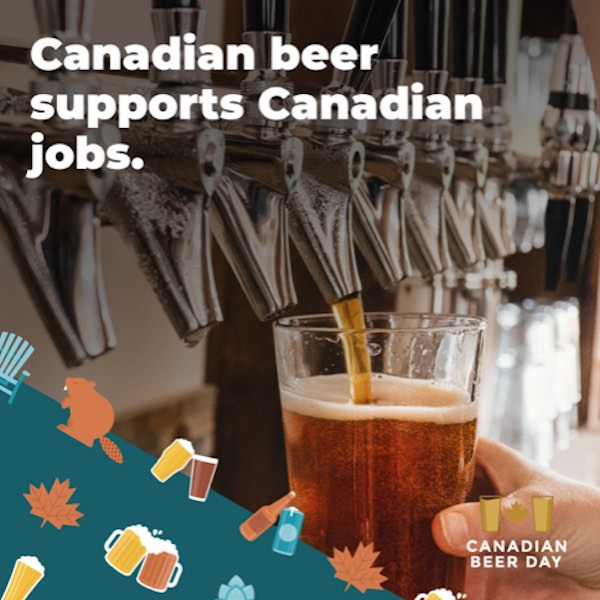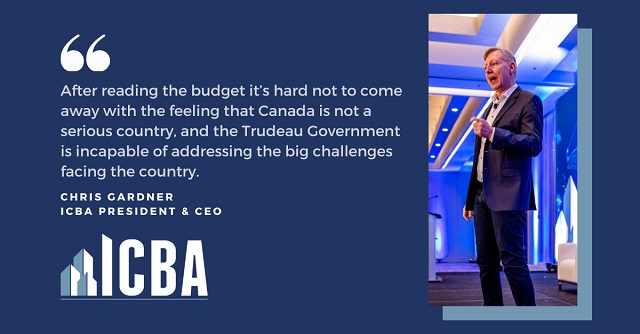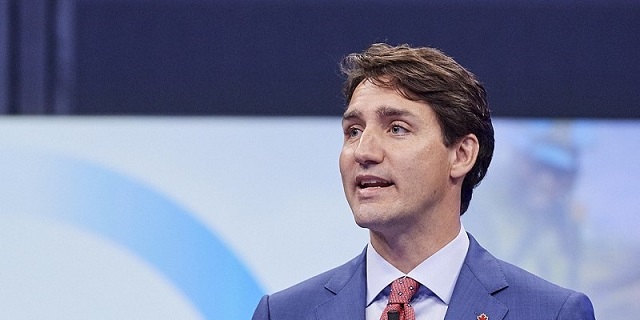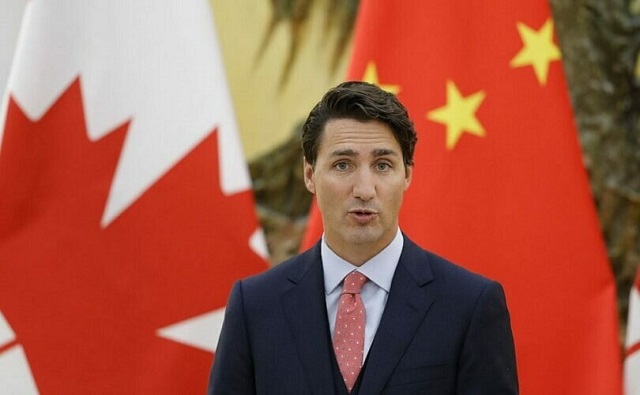Economy
Raise a glass to celebrate Canadian Beer Day

The third annual day dedicated to Canadian beer and our local brewing industry – Canadian Beer Day – is today – Wednesday, October 6, 2021, with coast-to-coast celebrations at local breweries, pubs, restaurants and at home with family and loved ones. Canadian brewers, beer enthusiasts, and the hardworking Canadians connected to the production and sale of beer across the country are raising a glass to #CheersAgain on this #CDNBeerDay – recognizing the positive impact beer has on our culture, communities, lives and economy.
First started in 2019, Canadian Beer Day is dedicated to celebrating beer and the thousands of Canadians involved in the brewing, selling, delivering, serving – and enjoying – Canada’s favourite beverage loved by millions across the country. The celebration, which occurs every year on the Wednesday before Thanksgiving, recognizes and celebrates beer and breweries in Canada and the workers directly involved in beer’s supply chain – agriculture, manufacturing, transportation, and hospitality.
“Beer brings Canadians together, and it’s been a part of our country’s culture and communities for generations. The last 18 months have been a challenging time for Canadians and businesses, specifically those in hospitality and tourism, making beer’s role in bringing friends and family together more important than ever,” said Dana Miller, Interim Director, Communications and Engagement for Beer Canada.
“Whether in a small or larger group this year, we hope that Canadians will join us in safely supporting our brewers, restauranteurs, barley farmers and all those connected to beer by raising a glass of your favourite Canadian-made beer today,” Miller added.
This year, Canadian Beer Day launched an initiative to fundraise for Food Banks Canada to help fellow Canadians struggling with food insecurity, especially during COVID-19. Apparel has been sold online to beer fans across the country, and Beer Canada will match all proceeds with a donation being made shortly after October 6.
Canadian brewers directly employ over 19,000 Canadians, and approximately 149,000 jobs across Canada’s hospitality, tourism, agriculture and manufacturing sector are supported by the production and sale of beer.
Canadian Beer Day is all about celebrating the beverage Canadians love, and the positive contributions brewers make to local communities across the country throughout the year. To find out more, visit www.canadianbeerday.ca.
QUICK FACTS
· 85% of the beer consumed in Canada is made here.
· Approximately 149,000 Canadian jobs are supported by the production and sale of beer.
· Over 19,000 Canadians work in breweries across the country.
· Canada is home to over 1,200 breweries.
· Beer contributes $13.6 billion to Canada’s GDP annually.
ABOUT BEER CANADA
Beer Canada is the voice of the people who make our nation’s beers. Our members account for 90% of the beer produced in Canada. The sale of beer supports 149,000 Canadian jobs, generates $14 billion in Gross Domestic Product and $5.7 billion in government tax revenues.
Agriculture
Bill C-282, now in the Senate, risks holding back other economic sectors and further burdening consumers

From the Frontier Centre for Public Policy
Bill C-282 currently sits in the Canadian Senate and stands on the precipice of becoming law in a matter of weeks. Essentially, this bill seeks to bestow immunity upon supply management from any potential future trade negotiations without offering increased market access to potential trade partners.
In simpler terms, it risks holding all other economic sectors hostage solely to safeguard the interests of a small, privileged group of farmers. This is far from an optimal scenario, and the implications of this bill spell bad news for Canadians.
Supply management, which governs poultry, egg, and dairy production in Canada, has traditionally enabled us to fulfill our domestic needs. Under this system, farmers are allocated government-sanctioned quotas to produce food for the nation. At the same time, high tariffs are imposed on imports of items such as chicken, butter, yogurt, cheese, milk, and eggs. This model has been in place for over five decades, ostensibly to shield family farms from economic volatility.
However, despite the implementation of supply management, Canada has witnessed a comparable decline in the number of farms as the United States, where a national supply management scheme does not exist. Supply management has failed to preserve much of anything beyond enriching select agricultural sectors.
For instance, dairy farmers now possess quotas valued at over $25 billion while concurrently burdening dairy processors with the highest-priced industrial milk in the Western world. Recent data indicates a significant surge in prices at the grocery store, with yogurt prices alone soaring by over 30 percent since December 2023. This escalation is increasingly straining the budgets of many consumers.
It’s evident to those knowledgeable about the situation that the emergence of Bill C-282 should come as no surprise. Proponents of supply management exert considerable influence over politicians across party lines, compelling them to support this bill to safeguard the interests of less than one percent of our economy, much to the ignorance of most Canadians. In the last federal budget, the dairy industry alone received over $300 million in research funds, funds that arguably exceed their actual needs.
While Canada’s agricultural sector accounts for approximately seven percent of our GDP, supply-managed industries represent only a small fraction of that figure. Supply-managed farms represent about five percent of all farms in Canada. Forging trade agreements with key partners such as India, China, and the United Kingdom is imperative not only for sectors like automotive, pharmaceuticals, and biotechnology but for the vast majority of farms in livestock and grains to thrive and contribute to global welfare and prosperity. It is essential to recognize that Canada has much more to offer than merely self-sufficiency in food production.
Over time, the marketing boards overseeing quotas for farmers have amassed significant power and have proven themselves politically aggressive. They vehemently oppose any challenges to the existing system, targeting politicians, academics, and groups advocating for reform or abolition. Despite occasional resistance from MPs and Senators, no major political party has dared to question the disproportionate protection afforded to one sector over others. Strengthening our supply-managed sectors necessitates embracing competition, which can only serve to enhance their resilience and competitiveness.
A recent example of the consequences of protectionism is the United Kingdom’s decision to walk away from trade negotiations with Canada due to disagreements over access to our dairy market. Not only do many Canadians appreciate the quality of British cheese, but increased competition in the dairy section would also help drive prices down, a welcome relief given current economic challenges.
In the past decade, Canada has ratified trade agreements such as CUSMA, CETA, and CPTPP, all of which entailed breaches in our supply management regime. Despite initial concerns from farmers, particularly regarding the impact on poultry, eggs, and dairy, these sectors have fared well. A dairy farm in Ontario recently sold for a staggering $21.5 million in Oxford County. Claims of losses resulting from increased market access are often unfounded, as farmer boards simply adjust quotas when producers exit the industry.
In essence, Bill C-282 represents a misguided initiative driven by farmer boards capitalizing on the ignorance of urban residents and politicians regarding rural realities. Embracing further protectionism will not only harm consumers yearning for more competition at the grocery store but also impede the growth opportunities of various agricultural sectors striving to compete globally and stifle the expansion prospects of non-agricultural sectors seeking increased market access.
Dr. Sylvain Charlebois is senior director of the agri-food analytics lab and a professor in food distribution and policy at Dalhousie University.
Business
Doubling Down on Missing the Mark

By Chris Gardner
President, Independent Contractors and Businesses Association
Earlier this year, public opinion research company Leger published the results of a nationwide poll. One result stood out: 70 per cent of Canadians agreed with the statement: “It feels like everything is broken in this country right now.”
To young people, families and business owners struggling to buy or stay in a home, find a doctor, pay for gas and groceries, hire people, worried about how unsafe our streets have become, or having to navigate a never-ending web of red tape to get projects approved, a deep sense of helplessness has set in.
Over the past few years, Canada’s long slow decline has become the subject of an avalanche of scrutiny and by every measure of social well-being and economic competitiveness, Canada is coming up short among its global peers. Canada’s ability to generate opportunities and long-term prosperity for its people is now at serious risk.
But anyone reading the 9th budget of the Trudeau Government looking for some relief from the big challenges that Canadian families and entrepreneurs are facing, will come away sorely disappointed.
It seems that every day there is a new report telling Canadians what they already know – buying or staying in a home has never been harder in this country. Just last week, RBC reported that it is the ‘toughest time ever’ to afford a home and that the share of household income needed to cover ownership costs is now 64% in Canada and an almost inconceivable 106% in Vancouver and 85% in Toronto.
CMHC estimates that we need to build 800,000 homes a year between now and 2030 to meet demand, while CIBC says it’s closer to 1 million. Keep in mind that in 2023 we built about 230,000 new homes.
With the shortage of people across every part of our economy now acute, a central question asked by many is ‘who will build all these homes?’. Our labour markets are undergoing a seismic shift – absent immigration, our population is flat-lining and will start to decline. Indeed, in B.C., in 2022, for the first time ever, natural births exceeded natural deaths – and it happened again last year.
Part of the answer is immigration. However, our immigration system is failing us. Last year we added a city the size of Calgary to our national population, and we are on track to do the same in 2024. Two major challenges have emerged. First, we have failed miserably to assess the skills gaps in our economy – doctors, nurses, technicians, teachers and trades workers – and attract them to Canada. Case in point: only 2% of all permanent immigrants in 2023 will pursue a career in the construction trades. Second, the torrid pace of our population growth is crushing affordability and overwhelming the infrastructure in our major centres. In 2021 there was a total of 1.3MN non-permanent residents in Canada; today we have 2.6MN. We must find a better balance – attract the people with the right skills to power our economy and in numbers that our schools, hospitals, transit systems and housing stock can reasonably absorb.
Canada has a remarkable competitive advantage in its natural resources – energy and minerals in abundance and in high demand. And, harnessing them provides some of the highest paying jobs in the country. Budget 2024 offered barely a passing reference to this enormous potential for Canada. No one should be surprised. Leaders from Germany, Japan and Greece have visited Canada and received the diplomatic equivalent of a cold shoulder at the suggestion that Canada supply their economies with much needed energy. One federal minister stated that Ottawa is ‘not interested in funding LNG projects.’ He missed the point completely – no one was asking Ottawa to fund anything; they simply want Ottawa to get out of the way.
Finally, last year, the CD Howe Institute reported that for every dollar that an American business spends on training, technology and capital – the essential ingredients for innovation – a Canadian company invests 58 cents. Business investment in Canada from 2015 to 2023 ranked 44 out of the 47 most advanced economies, according to the OECD. This matters because the more innovative Canadian firms, the more they spend on upskilling their people and on adopting new technology, the more they can increase the size of paycheques for workers. Canada’s lagging productivity is to the point where the Deputy Governor of the Bank of Canada said, “You know those signs that say, ‘In an emergency, break the glass?’ Well, it’s time to break the glass.”
After reading the budget it’s hard not to come away with the feeling that Canada is not a serious country, and the Trudeau Government is incapable of addressing the big challenges facing the country.
Why do so many people feel like everything in this country is broken? Because so much is breaking all around us.
Chris Gardner is the President and CEO of the Independent Contractors and Businesses Association.
The Independent Contractors and Businesses Association (ICBA), the largest construction association in Canada, represents more than 4,000 members and clients. ICBA is one of the leading independent providers of group health and retirement benefits in Canada, supporting nearly 170,000 Canadians, and the single largest sponsor of trades apprentices in B.C. ICBA is Merit Canada’s affiliate in B.C. and Alberta. www.icba.ca
-

 Alberta2 days ago
Alberta2 days agoFree Alberta Strategy backing Smith’s Provincial Priorities Act
-

 Business19 hours ago
Business19 hours agoFederal budget fails to ‘break the glass’ on Canada’s economic growth crisis
-

 Automotive2 days ago
Automotive2 days agoBiden’s Kill Switch: The Growing Threat of Government Control of Your Car
-

 Business2 days ago
Business2 days agoUS firms like BlackRock are dropping their climate obsession while Europe ramps theirs up
-

 MacDonald Laurier Institute2 days ago
MacDonald Laurier Institute2 days agoThe Governor General deserves better, but we deserve impartiality
-

 Economy2 days ago
Economy2 days agoFederal budget: You can’t solve a productivity emergency with tax hikes
-

 COVID-191 day ago
COVID-191 day agoPro-freedom Canadian nurse gets two years probation for protesting COVID restrictions
-

 espionage1 day ago
espionage1 day agoTrudeau’s office was warned that Chinese agents posed ‘existential threat’ to Canada: secret memo









